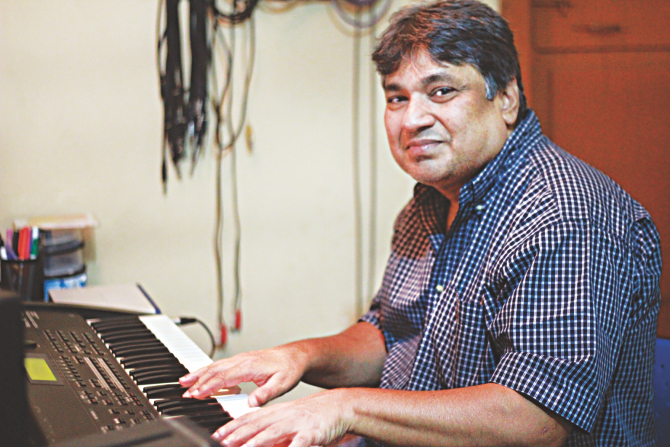PIONEERING BAND MUSIC

Fuad Naser Babu is a legendary name in the Bangladeshi music industry. Widely known as the music composer and keyboardist of the renowned band Feedback, Naser is also a pioneer in the organised band music movement of Bangladesh.
“I started my music back in 1972-73,” says Naser. “I would listen to all kinds of music, from The Beatles, Denver, Rolling Stones, Elton John to classical music, growing up,” he tells us. In 1975, Naser and his friends formed a band called Ostheer. “There was a restaurant in Dhanmondi called “Dimple” where we were asked to play on Saturdays There were few places in Dhaka back then that had live music, so this was a good opportunity for us.” In 1976, Feedback 20th Century, came into being. Feedback released several popular albums such as Ullash, Mela, Choddosho, Baulina, Feedback, and Bangabdo.
“In 2000, I created a studio, “Art of Noise” and many big bands recorded here,” says Naser, who still runs this studio. “Among these bands were Bangla, Renaissance, Cryptic Fate and many others so it was quite a busy studio. Now, the studio situation in Bangladesh has changed. All the musicians have their own work stations; some even record their music in their own bedrooms, so there is no demand for big studios now,” Naser tells us.
Through his 36 year long music career, Naser has seen many changes in the music industry. “The good things are that technology has changed, music style has changed, many new and fresh ideas have emerged. In past we used to record on a single track, it was called a monotrack, and all the musicians in a band had to play together, so it was quite difficult,” he explains. “The bands had to practice very hard to make a perfect recording. Nowadays we do vocals one day, guitar the next and so on. In a way it is easier but it also takes away from the team experience because the interaction is lacking and playing together is very important, I believe, in music.”
Naser believes that piracy has affected music drastically. “Our revenues and pay have gone down. Radio stations no longer respect the artists because sometimes they play our songs and fail to mention our names. There is copyright infringement everywhere,” he says. “Back in the day when HMV recorded in Kolkata, they had a system of paying royalties to the artists, based on the sales of their records. I don't know what went wrong with this system, but that no longer exists and artists are getting deprived of their rights to revenues,” he continues. “The fact of the matter is, a musician needs to make a living. This is happening all over the world. The sales of CDs have gone down because music is available for free all over the web. Developed nations have found a way to earn from that, but we have not.”
Fortunately, the situation is slowly improving. “Bangladesh has recently formed a CMO (Collective Management Organisation), which is a system that ensures royalties to authors, musicians, artists etc,” Naser explains. “ It was started by WIPO, the World Intellectual Property Organisation, which is also a part of the UN. They have set up CMOs in 38 countries all over the world, and this keeps a record of all the trading so that the artists receive their dues,” he says. “Bangladeshi government has recently approved of the CMO here, and they issue licences for traders, labels, radio stations, television channels, even restaurants and hotels that play our music. So things are slowly improving but I think by the end of 2016, we will have a proper CMO to protect our rights.”


 For all latest news, follow The Daily Star's Google News channel.
For all latest news, follow The Daily Star's Google News channel. 



Comments